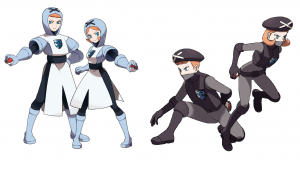Pokémon has a certain allure to children, notably through its commercial success. In the first year alone, Pokémon merchandise accounted for one billion dollars of profit in the United States alone (Li-Vollmer 2). Today, it has expanded into one of the largest entertainment franchises in the world. Any child would be enamored by the possibility of living in a world where you could travel to your heart’s desire, befriend and control mythical creatures possessing extraordinary abilities, and live freely with few restraints barring you from your dreams. By ten years, in the Pokémon world, any child could acquire their first Pokémon and head out and explore the world and encounter new and exciting adventures. In such a world, even adults would be tempted by such an opportunity. Adults in the Pokémon world must have also set off on their own journey; it seems as if this is just a perpetuating tradition, to allow ten year olds to tour the world and figure out what they want to do with their lives. At least in the anime, a style of Japanese animation, no adults really ever seem unsatisfied with their lives. The possibilities are simply endless, as there is never any indication of a lack of ability to do whatever you want. Does this qualify Pokémon as a utopia? Everyone in the world seems to have whatever they want, so is Pokémon actually a better world with cute, supernatural creatures?

The possibilities in career and life opportunities delve into utopian aspects. Richard Dyer, author of Entertainment and Utopia, juxtaposed social tensions, inadequacies, and absences with their utopian solutions. Possibilities in the Pokémon relate to these two contrasting categories; “Energy (work and play synonymous)…Intensity (open, spontaneous, honest communications and relationships)…Transparency (open, spontaneous, honest communications…)…Community (…collective activity)” (Dyer 278). These are the utopian solutions to exhaustion, dreariness, manipulation and fragmentation respectively. In the Pokémon world, through the connection of Pokémon, everyday tasks are changed. Work is no longer simple labor, life is no longer monotonous (especially with the always available possibility of travel), political opposition is no longer oppressive, and communities are no longer disconnected. Pokémon, as a source of entertainment, follows this analysis, which Dyer terms as, “offer[ing] some explanation of why entertainment works” (278). Although, as he also admits, and as Pokémon follows as proof, class, patriarchal, and sexual struggles are omitted and denied validity through this analysis. This is due to entertainment responding “to real needs created by society” (278). Yet, it still supports the utopian solutions that do exist for problems in today’s society.
With the freedom of choice in life paths, it would only feel obvious that the Pokémon world possessed stable economies and governments. But oddly enough, Pokémon lacks the appearance of any visible currency. Banks never appear in the television series. The economy, however it may be, cannot be determined at all; and from the knowledge given by the series, no forms of government exist either. Without such necessary constituents to a fully-functioning society, the Pokémon world has not collapsed. Instead, it has thrived into a utopic society seemingly free from major conflicts—but the truth is that the agglomeration of these utopian aspects cannot fully guarantee a perfect world.
Although major wealth gaps appear in the show, riches are minor luxuries in the world of Pokémon, where they may be easily acquirable. Affluent individuals can be distinguished from the average man. In multiple episodes of the anime, the main characters, led by Ash Ketchum, often stumble upon wealthy families with large mansions and wide plains of land owned by them. Professor Oak, a regional professor and scientist, is responsible for giving new trainers their first Pokémon. As a regional professor, he easily garners enough wealth to be considered to be one of the richest people in the region. Yet no significant social class differences appear. While some individuals remain rich and presumably powerful, never are they placed above others, which may or may not be just a consequence of utopian solutions implementing themselves to needs created by society, but defines and delimits too clearly “the legitimate needs of people in this society” (278). However, the lack of social class dynamics may also be taken as a utopian solution to social divides in society. Either way, wealth is not a determining factor in this consequence.
In the show, hard currency is never even seen. We know of the characters going out to purchase things, but never do we see a hint of a purse or credit card. The absence of currency is a statement to show that while money is present in Pokémon, it is by no means an important facet of the world. Some people may not possess as much wealth as others, but it does not diminish their own happiness and opportunities. As noted by Richard Dyer, the utopian solution to scarcity would be “abundance ([the] elimination of poverty for self and others; equal distribution of wealth)” (Dyer 277). Although wealth is not equally distributed, poverty is effectively eliminated in the show. Not a single instance occurs in the show where we can see a person stricken by poverty. By purposefully discluding any currency, Pokémon attempts to reinforce its own utopian aspects.
With the freedom granted in the Pokémon world, people have a variety of options to choose from. Close to no restrictions appear in this world, although some laws, or rules, are present throughout the regions even with the lack of a government. For example, trainers require trainer licenses in order to capture and train Pokémon. By neglecting or purposefully harming their Pokémon, these licenses may be taken away. In a perfect world, things such as these would not even need to occur. However, consequences to reckless decisions cannot be avoided. The existence of this problem does not detract from the argument that the Pokémon world is a utopia, it simply comprises another minor argument over the negative aspects in an otherwise utopian world.
Another interesting observation is the fact that healthcare is accessible to everyone without cost. Pokémon battles, the most popular sport of the Pokémon world, often end with numerous injuries to both sides as Pokémon engage in unpredictable combat although usually never ending with serious wounds. By going to the Pokémon Center, basically a Pokémon hospital, the treatment is quick, never costing any money as well.

Even though the amount of wealth an individual may possess may easily exceed another’s, not much monetary value actually exists in the show. Above all, Pokémon could be said to be more valuable than any quantity of money.
Although the Pokémon world is not home to overwhelming amounts of crime, crime is still inevitable. Pokémon poachers and crime syndicates manage to steal and cause harm to both people and Pokémon. However, there has been a lack of initiative to form larger police forces. Minor police forces exist in each town and city, but there has not been any organized force capable of stopping crime syndicates in the Pokémon world. One organization is present as a peacekeeper in the world, but its members do not engage crime unless it involves the endangerment of Legendaries, Pokémon vastly stronger than normal ones, who are also important to the natural order of the world, or the possibility of a massive loss of lives (given that they even possess the knowledge of such events). The only force who fights against these organized crime groups is Ash Ketchum, the protagonist, and his group of friends.
In every season, Ash faces off against these dangerous groups who wish to change the world through unleashing the power of Legendary Pokémon, who have the power akin to natural disasters. Although usually successful, the fate of the world rests on his shoulders time and time again. Rarely do people recognize the fact that without him, the regions would have been thrown into conflict and tragedy on multiple occasions. Arguably, the Pokémon world could be said to be a utopia for the general population. Besides having to labor to reach their goals, their lives could be said to be in paradise. However, the existence of the crime syndicates contradicts this point. These criminal groups were formed with one major goal in mind: change the world into a “better” one. Usually, this goal was just an excuse in order to mask their real purpose of taking over and becoming the ruling power. Unknowing of the difficulties in the world, the viewers are unable to figure out what major problems are present and if said goals ever had substance. Rather, only until the Unova region was the purpose clear for this specific group. At least for the other criminal groups, we could infer that the leaders possessed a strong desire for power. However, Team Plasma, the group inhabiting Unova, had a goal to “liberate” all Pokémon.

Although the relationship between people and Pokémon is harmonious for the majority of the show, the mistreatment of Pokémon is not an unfamiliar issue. In the first few episodes of the first season, we encounter a young Charmander, a reptilian-like fire Pokémon, sitting on a rock in the rain. Charmanders have flames on the tips of their tales, which signify their lives—if put out, the Charmander’s life could fade away. The Charmander that Ash and his friends found was heavily bruised and close to death because of the rain pouring on his tail. Later, after Ash rushes to the closest Pokémon Center to save its life, we find out that a trainer, those who train Pokémon to make them stronger, abandoned it because it was too weak. This reckless decision almost cost this Charmander its life. At the end, Team Plasma was corrupted and one of its leaders coveted power, thus trying to have him be the sole Pokémon master. However, its goal was not without basis. In a world where Pokémon place immense trust on their trainers, their ill-treatment is not as uncommon as it should be.
The utopia that Pokémon portrays is damaged by factors such as these. In the show, Pokémon are not just wild creatures. Some possess the ability to talk, as in speak human language, or to freely communicate with people. By terming their capture and training as enslavement, the view on this matter would be looking at it as the enslavement of an intelligent species. It is necessary, however, to look at the options of captured Pokémon as voluntary in most cases. Common knowledge in the show dictates that Pokémon acknowledge and strive for strength or companionship. Normal Pokéballs, small red-white balls used to capture Pokémon, are unable to hold a Pokémon if they truly wanted to escape. However, many choose to stay. As such, it is also necessary to acknowledge the mutual gain. The capturing and training of Pokémon actually functions as a reverse argument—both Pokémon and trainer accept this relationship in order to create a situation in which they can both benefit. This ideal can be looked upon as utopian; trainers seek to capture Pokémon to raise as strong companions to compete with others and Pokémon seek to grow stronger, a feat made possible by trainers.
Although a few occasions do occur where the idea of utopia may be challenged, for the most part, utopian aspects permeate throughout the Pokémon world. Freedom and accessibility to all paths with a general satisfaction with the state of being throughout the regions is the biggest utopian aspect of Pokémon. The reason why Pokémon was able to create such commercial success was due to the wondrous characteristics of the Pokémon world. From its release in 1996, where trading cards, manga interpretations and an anime soon followed due to the popularity of the franchise (History), to the selling of “Diamond” and “Pearl” games in Japan reaching five million after only a few months ten years later, Pokémon has continued to be a source of entertainment offered as an immersive alternative (Bulik). Its utopian aspects have allowed it to display a world much better than our own. In this world, freedom is paramount to its citizens, health care is available to everyone, crime is not an overwhelming issue, and the general population savor their experiences as youths and later grow up to fulfill their own roles obligingly.
This essay was read by Samuel Gilman. It is not a first draft.
References
Beth, Snyder Bulik. “Nintendo Unleashes Full Force of Pokémon.” Advertising Age78.17 (2007): 6. ProQuest. Web. 14 Nov. 2017.
Dyer, Richard. Only Entertainment. Routledge, 1992.
“History of Pokémon.” Bulbapedia, the Community-Driven Pokémon Encyclopedia, Bulbapedia, 13 Nov. 2017, bulbapedia.bulbagarden.net/wiki/History_of_Pok%C3%A9mon#Twenty_years_of_Pok. C3.A9mon.
Li-Vollmer, Meredith. “The Pokémon Phenomenon: A Case Study of Media Influence and Audience Agency in Children’s Consumer Culture.” Order No. 3053532 University of Washington, 2002. Ann Arbor: ProQuest. Web. 13 Nov. 2017.